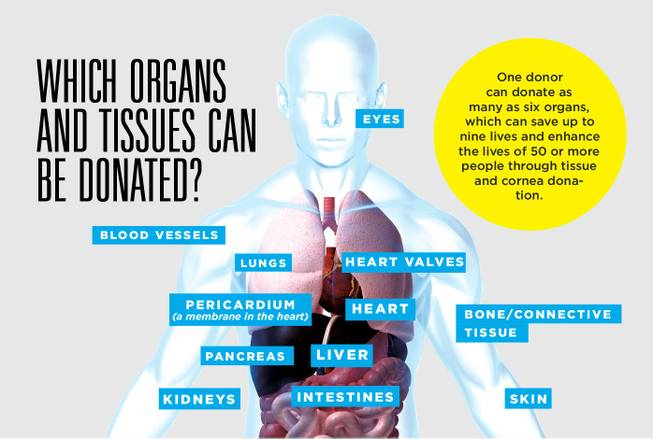
Sunday, April 3, 2016 | 2 a.m.
April is National Donate Life Month, a time to recognize and bring awareness to the importance of organ, eye and tissue donation. In the United States, more than 121,000 adults and children are on waiting lists for donor organs. More than 500 of them are in Nevada, and an average of 22 people in the United States die every day while waiting for a lifesaving transplant.
While many people are waiting for transplants, it’s important to note that organ, eye and tissue donation doesn’t benefit only those who receive donated organs; it helps the entire community by contributing to medical research. Researchers and doctors use donated tissue that isn’t viable for transplantation to better understand thousands of diseases and to find treatments to cure them. This helps guarantee better medical care for generations and potentially can save hundreds of thousands of lives far beyond transplant recipients.
While the advantages of organ donation are undeniable, the process of donation is more complicated than checking a box at the Department of Motor Vehicles. Alma Rodriguez, multicultural outreach coordinator at the Nevada Donor Network, helps us break down the process of organ donation.
How does the process work?
Referral: Any time a patient dies, hospitals and care facilities are required by federal law to notify the local organ procurement organization to determine whether the person is a possible candidate for donation.
Evaluation: The person’s medical state and medical history are evaluated to determine whether he or she can donate organs. There is no set evaluation criteria. Any patient can be considered as an organ, eye and tissue donor. Every case is unique and different.
Authorization: If the person is eligible for donation, the organ procurement organization will check the state’s donor registry to see if the person already is a registered donor. If the patient is not found on the state registry, the legal next of kin can authorize donation.
Family discussion: If the person did register to be an organ donor, the organ procurement organization will contact his or her family to make them aware of the person’s decision, explain the donation process, answer questions and provide support as needed. If the person is not a registered donor, federal and state law requires that family members still be offered the option of organ donation.
Donor care: Once donor status is confirmed, the organ procurement organization collects and compiles thorough records of the person’s medical and social history, including information about whether the person had any disease that could affect donation. Using this information, the organization determines which organs and tissues may be suitable for donation and whether there are any potential risks for recipients. Any findings, test results or other relevant information are submitted to the United Network for Organ Sharing database, which generates a list of potential recipients.
Finding a recipient: Once that list is generated, organ procurement officials begin contacting transplant centers to inform them about a possible organ match. A potential recipient’s surgeon may ask questions and request additional information before deciding whether to accept or decline the organ. If the doctor declines, the next transplant center on the list is contacted. This process continues until all of the viable organs are placed. The identity of recipients on the transplant list remains confidential by using unique identification numbers.
Organ recovery: Once each organ has been assigned to a recipient, the organ procurement organization works with the hospital to coordinate the organ recovery operation.
Family support: Once the organs are transplanted, the family of the donor receives general information about the recipient of each organ. Family members can write to the recipients and receive a copy of the donation authorization form and a remembrance journal.
Which organs and tissues can be donated: Eyes, lungs, blood vessels, heart valves, pericardium (a membrane of the heart), pancreas, liver, kidneys, intestines, heart, bones/connective tissue, skin.
About 40 percent of adults in Nevada are registered donors, which is below national average. To learn more about about organ, eye and tissue donation, to find volunteer opportunities and to register to be a donor, visit NVdonor.org

Join the Discussion:
Check this out for a full explanation of our conversion to the LiveFyre commenting system and instructions on how to sign up for an account.
Full comments policy